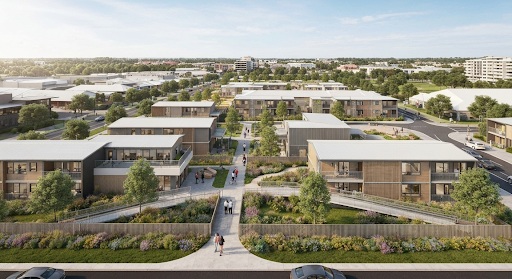Key Highlights
- Explore various NDIS housing options, including Specialist Disability Accommodation (SDA) and Supported Independent Living (SIL).
- Understand how your NDIS plan can be tailored to support your unique housing and healthcare needs.
- Learn how NDIS plan management helps you control your NDIS funds and pay service providers promptly.
- Discover the eligibility criteria and the step-by-step process for applying for housing support.
- See how integrating accessible healthcare with housing helps NDIS participants achieve inclusive living.
- Effective plan management gives you the choice and control to select the providers that best suit you.
Introduction
Finding the right home is about more than just a roof over your head; it’s about creating a life of independence, comfort, and community connection. For many NDIS participants, securing suitable housing that also provides accessible healthcare is a crucial step toward inclusive living. Your NDIS plan is a powerful tool designed to help you achieve these goals. With the right support, like effective NDIS plan management, you can navigate your options and find a living arrangement that empowers you to thrive.
NDIS Housing and Accessible Healthcare Solutions for Inclusive Living in Australia
The National Disability Insurance Scheme (NDIS) offers a range of housing and living solutions designed to support the diverse needs of participants. Your NDIS funding can open doors to various accommodation types, from specialised homes for those with high support needs to arrangements that promote greater independence. The goal is to ensure you have a safe, comfortable, and accessible place to call home.
Working with experienced service providers is key to finding the right fit. They can help you understand your NDIS plan, explore housing options, and connect you with the supports needed for daily living. The following sections will explore some of the main housing supports available to NDIS participants.
1. Specialist Disability Accommodation (SDA) and Its Key Features
Specialist Disability Accommodation (SDA) is a specific type of NDIS housing created for participants with extreme functional impairment or very high support needs. This funding is for the physical home itself, which is designed and built to be highly accessible and enable the delivery of complex supports. If you have significant physical challenges, SDA can provide a home that is tailored to your needs.
These dwellings are more than just accessible; they incorporate features that make daily life safer and more manageable. By meeting strict design standards, SDA homes ensure residents can comfortably and safely access all areas of the house. This specialised approach helps remove physical barriers that can exist in standard housing.
Key features of SDA homes often include:
- Structural provisions for ceiling hoists and ramps for mobility.
- Chair lifts to navigate different levels of the home.
- Smart technologies, such as automated lighting, remote sensors, and temperature control, to enhance independence.
2. Supported Independent Living (SIL): Promoting Independence
Supported Independent Living (SIL) is an NDIS support that helps you live as independently as possible while receiving assistance with daily tasks. SIL funding covers the support services you receive in your home, which is often a shared living arrangement with other NDIS participants. This option is ideal if you have a degree of independence but still need some help with your day-to-day life.
The core purpose of SIL is to build your skills and foster greater independence. In a SIL home, support staff are on hand to help with various activities, ensuring your needs are met while respecting your autonomy. It’s a popular choice for those who want to live in a social environment and meet others with similar interests, all while working toward their personal goals. Whether you’re just starting your NDIS journey or reviewing your current support, speaking with a plan manager in Adelaide can help you make informed decisions and act in your best interests when choosing a provider.
SIL supports can help you with:
- Personal care, meal preparation, and other household tasks.
- Developing new skills and participating in community and social activities.
3. Individualised Living Options (ILO): Tailoring Support to Needs
Individualised Living Options (ILO) focus on creating a living arrangement that is completely tailored to you. Rather than fitting into a pre-existing model, an ILO is a package of supports that helps you live in the way you choose. This could mean living with housemates, in your own home with drop-in support, or in a host arrangement. The focus is on flexibility and designing a support system that works for your specific goals and preferences.
Your NDIS plan is central to developing an ILO. It involves exploring what you want your home life to look like, who you want to live with, and what support you need. The process is a collaborative one, where you, your family, and your support network come together to create a personalised plan. This ensures the support you receive is truly individualised.
Using your NDIS funds for an ILO gives you immense choice and control. You can decide how and when you receive support, empowering you to live more independently. It’s about finding creative and flexible solutions that help you live the life you want, supported by a network that understands your needs.
4. Community Housing Partnerships for NDIS Participants
Community housing partnerships offer another valuable pathway to finding a suitable home. These collaborations involve NDIS service providers working with community housing organisations to create accessible and affordable living options for NDIS participants. This approach helps increase the availability of appropriate housing and integrates you into the broader community.
These partnerships can provide a variety of housing types, from apartments to shared houses, often with a focus on social inclusion. By working together, service providers and community housing groups can ensure that the physical environment is accessible and that the right supports are available on-site or nearby. This model is particularly beneficial in creating vibrant, inclusive communities.
Key benefits of these partnerships include:
- Access to a wider range of housing options that may not be available through the open rental market.
- Strong connections with local organisations and community support networks, enhancing social participation.
5. Integrating Accessible Healthcare Services with NDIS Housing
True inclusive living is achieved when your housing and healthcare needs are met seamlessly. Integrating accessible healthcare services with your NDIS housing ensures you receive the right support in the comfort of your own home. This approach means that everything from personal care to more complex health support is coordinated and delivered where you live, reducing the need for constant travel and appointments.
Your NDIS funding can be used to facilitate this integration. Whether you live in an SDA, SIL, or another housing type, your plan can include funding for support workers, nursing care, and therapeutic services delivered at home. Reputable service providers play a crucial role in coordinating these services, ensuring your health and wellbeing are prioritised.
This holistic approach simplifies managing your health and daily life. It provides peace of mind knowing that support is readily available, allowing you to focus on achieving your goals and participating in your community.
| Housing Type | Integrated Healthcare & Support Services |
| Specialist Disability Accommodation (SDA) | High-intensity personal care, clinical support from nurses, assistive technology management, and 24/7 support. |
| Supported Independent Living (SIL) | Daily personal care (showering, dressing), meal preparation, medication assistance, and community access support. |
| Private Home with Modifications | In-home therapy (OT, physio), domestic assistance, and support with assistive technology installation and use. |
Navigating Eligibility and Application for NDIS Housing and Healthcare Support
Understanding how to access NDIS housing and healthcare support begins with navigating the eligibility and application process. Not all NDIS participants are automatically eligible for specific housing funding like SDA or SIL; it depends on an assessment of your individual needs and circumstances. The first step is to have a clear conversation about your living goals during your NDIS planning meeting.
Tools like NDIS plan management can simplify this journey. A plan manager can help you understand your budget and ensure claims are processed correctly, freeing you up to focus on finding the right providers. The next sections will detail the eligibility criteria and provide a step-by-step guide to applying for support.
Understanding Eligibility Criteria for NDIS-Funded Living and Health Services
To access NDIS-funded housing and living services, your eligibility must be formally assessed by the National Disability Insurance Agency (NDIA). This assessment determines the level and type of support you require based on your disability and its impact on your daily life. For specialised housing like SDA, you must demonstrate that you have an extreme functional impairment or very high support needs.
The criteria are specific to ensure the funding goes to those who need it most. Simply being an NDIS participant does not guarantee approval for all housing types. Your NDIS plan must clearly state your need for a particular living arrangement, supported by evidence from therapists or other health professionals.
Key points on eligibility include:
- You must meet the general NDIS eligibility requirements, including age, residency, and disability criteria.
- Your need for specialised housing or in-home support must be directly linked to your disability and be considered “reasonable and necessary” by the NDIA.
Step-by-Step Guide to Applying for NDIS Housing Support
Applying for NDIS housing support can feel complex, but breaking it down into steps makes it more manageable. The journey begins with your NDIS planning conversation, where you should clearly articulate your housing goals and support needs. Having a clear vision of what you want to achieve is essential.
Working with professionals can make a significant difference. A support coordinator can guide you through the process, helping you gather the necessary reports and evidence to support your application. Once you have funding in your NDIS plan, you can start searching for suitable service providers and housing vacancies. Effective plan management ensures your funds are ready to be used when you find the right option.
Here is a simple guide to get you started:
- Discuss Goals: Talk to your NDIS planner or Local Area Coordinator (LAC) about your desire for housing support.
- Gather Evidence: Work with occupational therapists and other specialists to get assessments that support your need for specific housing.
- Explore Options: Use tools like the SDA finder on the NDIS website or work with service providers to find available properties.
- Choose Your Supports: Select providers for housing and other supports, and let your plan management team handle the invoices.
Conclusion
In conclusion, NDIS housing and accessible healthcare play a crucial role in creating an inclusive living environment for individuals with disabilities. By understanding the various options available, such as Specialist Disability Accommodation (SDA) and Supported Independent Living (SIL), you can make informed decisions that best suit your needs. Navigating the eligibility and application processes may seem daunting, but taking it step by step will empower you to access the support you deserve. Remember, the journey toward inclusive living starts with awareness and action. For personalised guidance or to explore your options further, feel free to reach out for a free consultation—we’re here to help!
Frequently Asked Questions
What is the difference between NDIS housing and DSP housing support?
NDIS housing support, funded through your NDIS plan, is specifically for participants with significant disabilities needing specialised accommodation like SDA or in-home supports like SIL. This funding is separate from general income support or rent assistance, such as the Disability Support Pension (DSP), which helps with everyday living costs but does not fund disability-specific housing modifications or support services.
How does NDIS plan management impact access to housing and healthcare services?
NDIS plan management gives you more choice and control over your NDIS funds. A plan manager handles your budget and pays invoices promptly, allowing you to use both NDIS-registered and unregistered service providers. This flexibility expands your options for finding the best-fit housing and healthcare services without the stress of managing the financial admin yourself.
Are there location-specific NDIS housing options, such as in Adelaide?
Yes, there are location-specific NDIS housing options and support teams available across Australia. For example, NDIS participants in Adelaide can connect with service providers who have local knowledge and close connections with the community. This ensures you receive tailored support from a team that understands the opportunities in your area. This information is current as of late 2024.



